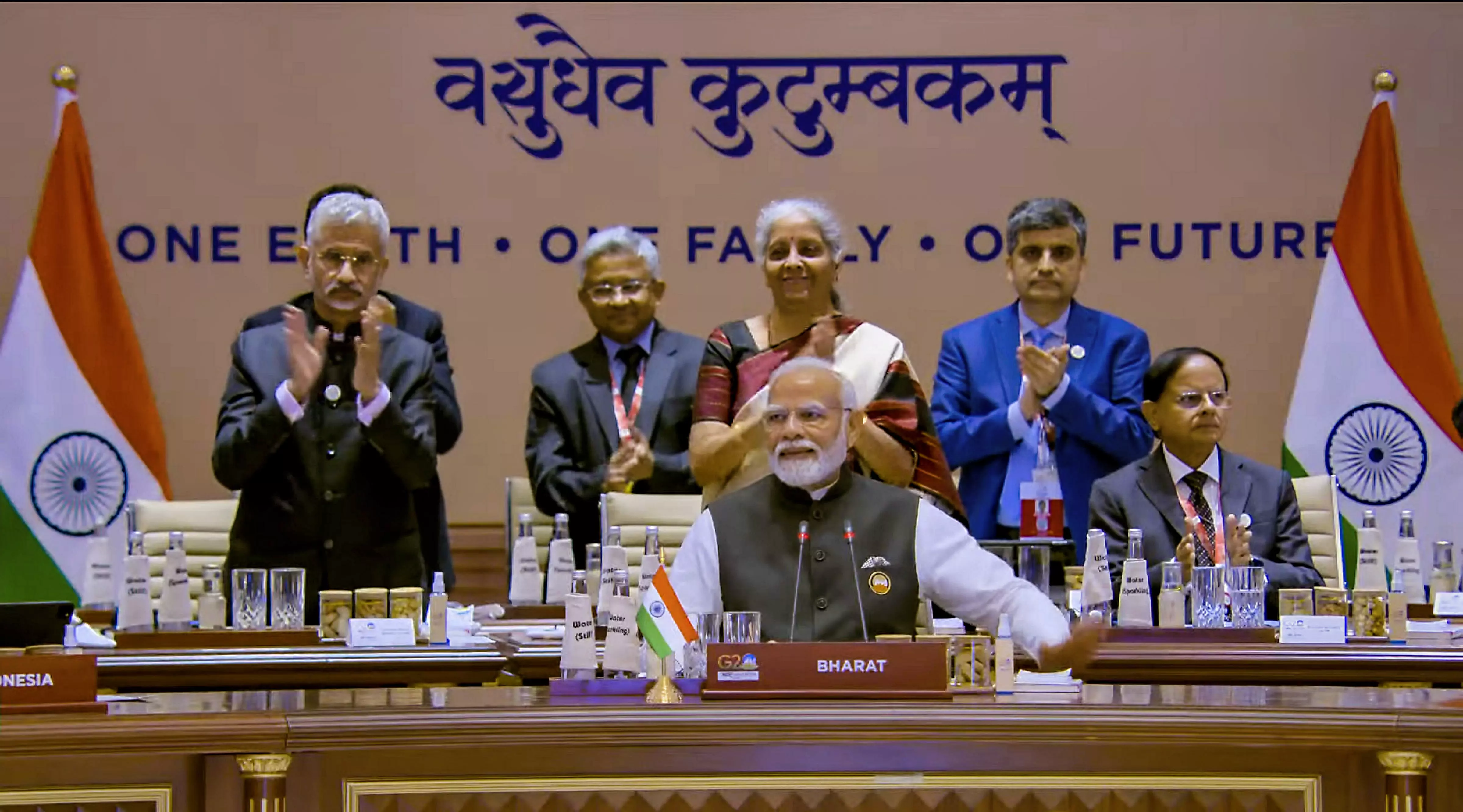
Prime Minister Narendra Modi during the Session-2 on 'One Family' during the G20 Summit 2023 at the Bharat Mandapam, in New Delhi, Saturday, September 9. PTI Photo
G20 Summit: Climate change takes centre stage amid geopolitical strains
India aims to leverage its G20 presidency to underscore its commitment to environmental leadership and debt restructuring for vulnerable economies

The G20 Leaders’ Summit in Delhi faces a challenging landscape marked by geopolitical tensions, notably the Russia-Ukraine conflict and the intensifying US-China rivalry. The absence of Chinese President Xi Jinping compounds these challenges. Against this backdrop, climate change is expected to be a significant focus, with high stakes due to escalating global climate impacts.
India, currently holding the G20 presidency, has ambitious plans in this regard. Still, a lack of agreement in prior meetings has stymied efforts to reach a consensus on pivotal issues like energy transition, green financing, and sustainable development. The summit offers a crucial opportunity to address issues, including fossil fuel phaseout, increasing renewable energy commitments, and tackling climate finance needs estimated to be over $2.4 trillion annually by 2030.
Indian Prime Minister Narendra Modi has made concerted efforts to elevate India’s global standing. Still, the absence of Xi Jinping and Russia’s Vladimir Putin puts a damper on the summit’s prospects for comprehensive agreements. A previous meeting of energy and climate ministers resulted in summary documents instead of a joint communiqué due to disagreements, leaving some hopeful that at least a minimal consensus can be reached during the Leaders’ Summit.
The money issue
Finance remains a focal point, with the G20 having the potential to unlock trillions in investments required for developing countries’ energy transition. China’s reluctance to come to a common understanding of debt resolution adds complexity to the discussion. The White House has indicated that President Joe Biden will bring a World Bank offer to the table, but US congressional approval remains a hurdle, particularly given the upcoming Presidential elections. The European Union and Saudi Arabia are also pressured to make substantive financial commitments to renewable energy and adaptation efforts.
Saudi Arabia has resisted fossil fuel phaseout proposals, and members remain divided on defining abatement. The European Union reportedly supports a fossil fuel phaseout deal, but China seeks to delete references to past G20 commitments on eliminating inefficient fossil fuel subsidies. India has shown leadership by reducing its fossil fuel subsidies by 76 per cent since 2014 while increasing support for clean energy.
Coal remains a contentious issue, largely absent from the talks, even though G20 countries are home to most of the world’s coal infrastructure. Achieving global climate goals remains elusive without consensus on phasing down coal. Indian authorities are pushing for an agreement but face the risk of backsliding if the topic isn’t included in the summit’s final documents.
Germany is pushing for a COP28 agreement to triple renewable energy usage, although developing countries demand clarity on how this will be financially supported. In the G20, wind and solar have increased from 5 per cent to 13 per cent of electricity share since 2015.
Need for a shift
India aims to leverage its G20 presidency to underscore its commitment to environmental leadership and debt restructuring for vulnerable economies. Various experts have weighed in on the critical need for reform in multilateral development banks and international finance systems to address the climate crisis, emphasizing that the G20 could be pivotal in shaping these reforms.
Despite their collective economic and emissions footprint, G20 nations have yet to deliver on the promise of bold climate action, a shortfall exacerbated by geopolitical frictions. This year’s summit could be a turning point, but it necessitates a shift from political one-upmanship to cooperative effort if global climate goals are to be met.
